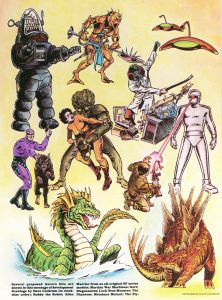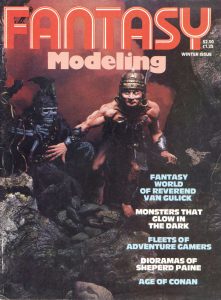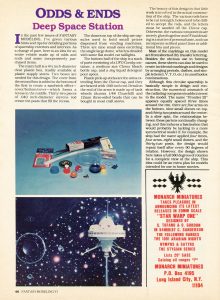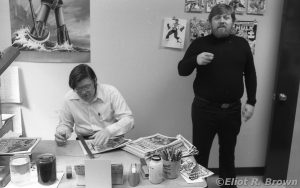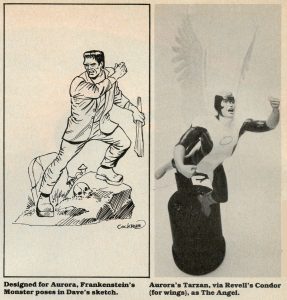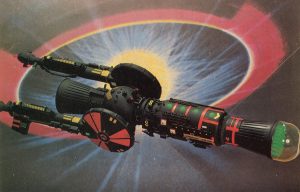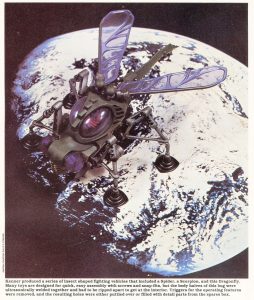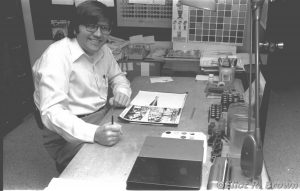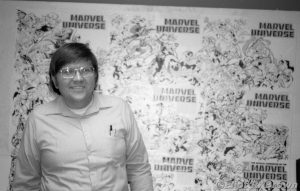Young Andy Yanchus didn’t just enthuse about airplanes and aerospace—he read comics. It might come as no surprise that Blackhawks is high on his list of faves. [Blackhawks is a long-lived series about a band of battle-hardened pilots fighting oppression and evil, back during WWII, the Axis Powers—but on into the 80s as well. More recently, solid work was done by Dan Spiegel and a bit later, Howie Chaykin. There’s still a chance that Producer/Director Steven Spielberg has an option on the book… –Air-Worthy Brown]
Turns out Andy was of such an age and comic enthusiast that when the first comic convention convened in New York City back in 1964, Andy was the second name on the sign up sheet. You may well wonder who managed to throw some elbows and be #1? George R. R. Martin—the very one. Who was a slippery teenager then and could out-maneuver Andy.
You may well laugh to learn that there were only 56 attendees that time. And enjoy the laugh till I tell you this was Steve Ditko’s first and ONLY convention. It was also the late but still dear, Flo Steinberg’s first but not last con! Stan couldn’t get there, but sending his very own secretary and prime fan contact person in his stead was a pretty good gesture.
Andy put his young energies into volunteering for the upcoming conventions. And must have demonstrated the same sort of drive and enthusiasm that he had applied to modeling and model-making.
During all that time, Andy was at Aurora, producing car kits, slot car bodies and the monster series. Aurora’s rep is still huge from those “monsters.” Andy’s own work on the later line of “dungeon accessories” was as developer and designer. Andy felt the need to leave Aurora in 1975, which was, “no fun anymore.” Considering what a small, closely held start the company had, getting bigger attracted the attention of big money, corporate pressures and decisions. It is noteworthy that Aurora closed shop not so long after Andy left, 1977.
Andy seems to represent the living nexus of the two universes; comics and modeling. In the short time between his departure from Aurora and signing on to Marvel, he attended comic conventions. At one convention, a mutual friend brought Andy and Dave Cockrum together. Turns out they had all the same interests and an instant friendship was formed. Mutual interests, indeed! Andy had a lot of domestic and international connections in the modeling world. For instance, he was able to get a few boxes of Mr. Spock models—the American side of Aurora didn’t want to pay the stiff licensing fee. But in England, things were different. Thus Andy was able to do some hand-across-the-ocean sort of thing—early con attendees could get their Mr. Spock. One mad-dog Trek fan was Mr. Dave Cockrum. When Aurora wished to do some Product Developing, Andy turned to Dave. He could not just draw a proposed character, but figure out how the plastic part breakdown would affect the pose. Dave was not just working on one of the hottest comic titles (X-Men) but as Andy says, “–was a hell of a modeler!” Andy doesn’t say that easily.
This collage (no doubt done by Dave’s wife, Paty and colored by her too) of model kit proposals by Dave appeared in Fantasy Modeler #5. This appeared in an article, where Andy interviewed Dave Cockrum. While working at Marvel, Andy wrote a series of articles for Fantasy Modeler on scratch building sci-fi subjects, kit reviews (Dave too!) and improving or converting toys into display pieces. FM itself, was a really nice attempt to try a little of everything in the hobby/entertainment world. Including nascent video games! Several major league modelers contributed, Dave Merriman (who would build several giant submarine models for Hunt For Red October) and world-reknowned dioramacist, the late, Shep Paine!
The offices of Fantasy Modeler were a short ways south from the Marvel Editorial offices in 1981. Andy would bring in the build so the publisher could photograph it. Then again, sometimes the Bullpen would contrive to make use of it somehow…
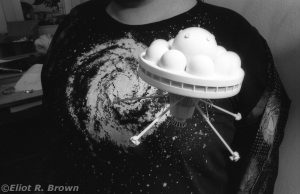
Here is where the piece was used in staffer Carl Gafford’s hilarious but moribund project: President of Space! [Make sure to look up my heart-rending article of the highs and lows of that project, somewhere here on these blogs! – Space Head Brown] The beneath-the-bottom-of-the-barrel production values made use of a special effects T-shirt worn by celebrated staffer, Duffy Vohland!
At the point in time this interview appeared, both Andy and Dave (Paty too!) were on staff at Marvel.
In that same interview, a product concept illustration and a model that Dave scratch-built appeared:
I call attention to that model because a) I took that picture and b) it was a magnificent combination of subjects, Aurora’s Tarzan and (model company) Revell’s Condor (wings) to make a third subject: X-Men’s The Angel. This model was intended to be a gift to Writer Creator Jo Duffy! Dave’s superlative eye/hand coordination made painting the subject an exercise in beauty. The attachment of the wings to the body, ideal. It was a terrific statement. [Alas! The light blue backdrop and the just-white wings faded together in the black & white version of the full-color original—but it’s all there! –Repro Brown]
“Scratch building” for those who do not speak “model” is the art of bringing together other things in order to make one thing. Literally, starting from “scratch.” If you managed to read Andy’s article above, you’d see that you can find common household stuff and make it into a neat, single subject. Other scratch building methods make use of model-making materials. Raw materials like sheet styrene or brass tubing, that need to be shaped, molded and otherwise abused to the modeler’s will!
Here is photo of a scratchbuilt space ship by Dave. If you look carefully, you can see things like roll-on deodorant caps, gum machine clear parts—all sorts of stuff. A good deal of scratchin’ is in the paint job!
Finally—the image below ran in FM #3. I must point out that this mechanical insectoid-ish space-faring craft pre-sages “steam punk” and “cyber punk” by a few decades. Andy packed a lot of imagination into his work.
Andy went on to work for Marvel for the next 17 years. Half of that on-staff; the other “on contract.” Which is another way of saying “thanks, here’s some steady work!” Let me try to indicate just how good Andy was as a colorist.
When color guides were done using photostat paper—art changes or a color mistake would need correcting. Andy would go to the trouble of taking a fresh X-Acto knife blade and cut around the area that needed changing. He would lift off the thin emulsion layer which left behind the base paper. Into this area he would Scotch Tape an identical shape from a Xerox copy. Remarkable to watch.
I must remark that Andy Yanchus has an artistic soul. Model-making and coloring with water colors, etc. are broad aspects of many fields of art. There’s technical illustration and I believe, more conventional illustration in the model assembly guides—but sculpting, applying paint, conceiving of the shapes in three-dimensions, working in several paint mediums and doing them all superlatively well—as I say, the soul of an artist.
I have often tried to explain the labor intensive hand coloring process. A “coloring guide” was something for the separator to follow when making the film that would be used to make the printing plates—in all their colors.
In the good old days, the original art was reduced to the size it would be printed at. A photostat was made of each page. But making stat paper take the water colors was sometimes a nuisance (purple dye in particular!). Andy points out it was Marie Severin, arguably the best all-round artist but the best colorist who ever dipped a brush, who realized that coloring on conventional copier paper was a helluva lot easier than blotting the damn colors on stat paper!
Another story involved Techno-Militaro Creator/Writer All-Things-G. I. Joe Editor Larry Hama. He needed a Joe book done over the weekend. He insisted Andy get the job because he would know the proper colors of the aircraft with no struggle from the Editor to find reference. (A Lancaster Bomber!)
Indeed, when it came time to color my own techie bits of gibber for the Marvel Universe books, I felt only Andy could be trusted to not only separate the planes within my drawings but make details more understandable. Series Editor Mark Gruenwald and I were on the same page when finding someone to do that coloring.
Last Marvel story, I promise! Marvel Bullpen, 575 Madison Ave—6th Floor offices. Sol Brodsky’s able secretary, Martha Conway and Editor Ralph Macchio had a feud under way… At one point, a water pistol was brought in to deal justice—but, I must wag my finger at this, as water and comic book artwork don’t mix. It got to the point where Ralph would wrest the water pistol away from petite Martha and bully her with water. Hard to say who thought of this; most likely Andy—but Andy took a regular water pistol, broke it, re-wangled it, repaired it nearly invisibly and put it into action.
The next time Martha idly threatened Ralph by waving a water pistol around, Ralph leaped into action. He bravely strode along the firing line to yank the pistol from Martha, reversed it, raised it to her face and pulled the trigger!
Andy had re-worked the interior so the water shot backwards. It was wonderful. Of all the things I managed to see but not photograph—at least I saw that. Ralph took one shot, got himself right in his eye… tried several more times in utter confusion and then realized what was happening. That’s the sort of thing that set the Marvel Bullpen apart from the rest of the world—people like Andy!
[Some material has been copied from Fantasy Modeler Magazine with no particular permission from the Publishers. The mag is defunct and the publisher deceased. If there are any representatives of the estate who wishes for these few pages and images to be removed, please contact me here! –Honest Brown]

